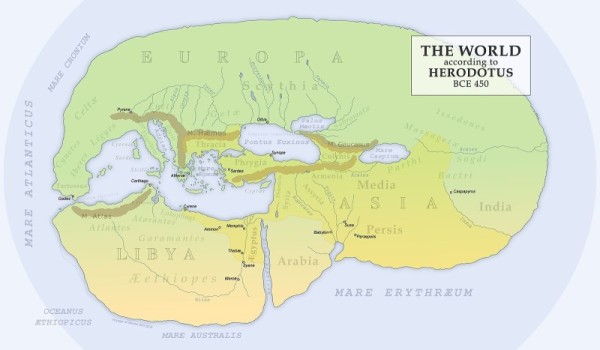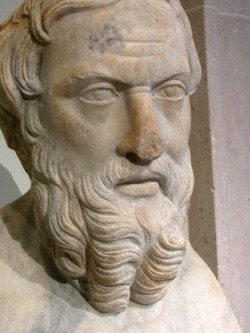“King Darius commands the Persians who are in Sardis to slay Oroites.”

Translated by George C. Macaulay — our special project presenting the complete Herodotus with URLs for all of those people, places, events, and things which baffles and discourages modern readers.
Previously on Herodotus
128. Thus Darius asked, and thirty men undertook the matter, each one separately desiring to do it himself; and Darius stopped their contention and bade them cast lots: so when they cast lots, Bagaios the son of Artontes obtained the lot from among them all. Bagaios accordingly, having obtained the lot, did thus:—he wrote many papers dealing with various matters and on them set the seal of Darius, and with them he went to Sardis. When he arrived there and came into the presence of Oroites, he took the covers off the papers one after another and gave them to the Royal Secretary to read; for all the governors of provinces have Royal Secretaries. Now Bagaios thus gave the papers in order to make trial of the spearmen of the guard, whether they would accept the motion to revolt from Oroites; and seeing that they paid great reverence to the papers and still more to the words which were recited from them, he gave another paper in which were contained these words: “Persians, king Darius forbids you to serve as guards to Oroites”: and they hearing this lowered to him the points of their spears. Then Bagaios, seeing that in this they were obedient to the paper, took courage upon that and gave the last of the papers to the secretary; and in it was written: “King Darius commands the Persians who are in Sardis to slay Oroites.” So the spearmen of the guard, when they heard this, drew their swords and slew him forthwith. Thus did retribution for the murder of Polycrates the Samian overtake Oroites.
129. When the wealth of Oroites had come or had been carried up to Susa, it happened not long after, that king Darius while engaged in hunting wild beasts twisted his foot in leaping off his horse, and it was twisted, as it seems, rather violently, for the ball of his ankle-joint was put out of the socket. Now he had been accustomed to keep about him those of the Egyptians who were accounted the first in the art of medicine, and he made use of their assistance then: but these by wrenching and forcing the foot made the evil continually greater. For seven days then and seven nights Darius was sleepless owing to the pain which he suffered; and at last on the eighth day, when he was in a wretched state, some one who had heard talk before while yet at Sardis of the skill of Demokedes of Croton, reported this to Darius; and he bade them bring him forthwith into his presence. So having found him somewhere unnoticed among the slaves of Oroites, they brought him forth into the midst dragging fetters after him and clothed in rags.

CC BY-SA 2.0 image from Wikipedia.
130. When he had been placed in the midst of them, Darius asked him whether he understood the art; but he would not admit it, fearing lest, if he declared himself to be what he was, he might lose for ever the hope of returning to Hellas: and it was clear to Darius that he understood that art but was practicing another, and he commanded those who had brought him thither to produce scourges and pricks. Accordingly upon that he spoke out, saying that he did not understand it precisely, but that he had kept company with a physician and had some poor knowledge of the art. Then after this, when Darius had committed the case to him, by using Hellenic drugs and applying mild remedies after the former violent means, he caused him to get sleep, and in a short time made him perfectly well, though he had never hoped to be sound of foot again. Upon this Darius presented him with two pairs of golden fetters; and he asked him whether it was by design that he had given to him a double share of his suffering, because he had made him well. Being pleased by this saying, Darius sent him to visit his wives, and the eunuchs in bringing him in said to the women that this was he who had restored to the king his life. Then each one of them plunged a cup into the gold-chest and presented Demokedes with so abundant a gift that his servant, whose name was Skiton, following and gathering up the coins which fell from the cups, collected for himself a very large sum of gold.
131. This Demokedes came from Croton, and became the associate of Polycrates in the following manner:—at Croton he lived in strife with his father, who was of a harsh temper, and when he could no longer endure him, he departed and came to Egina. Being established there he surpassed in the first year all the other physicians, although he was without appliances and had none of the instruments which are used in the art. In the next year the Eginetan State engaged him for a payment of one talent, in the third year he was engaged by the Athenians for a hundred pounds weight of silver, and in the fourth by Polycrates for two talents. Thus he arrived in Samos; and it was by reason of this man more than anything else that the physicians of Croton got their reputation: for this event happened at the time when the physicians of Croton began to be spoken of as the first in Hellas, while the Kyrenians were reputed to have the second place. About this same time also the Argives had the reputation of being the first musicians in Hellas.
– Herodotus, Book III
| <—Previous | Master List | Next—> |
Herodotus made his living by being interesting. In a world where most people did not read and could not afford to buy a book even if they could, they would pay to listen to Herodotus recite from his books. They would not pay to be bored. In that world, the names that populate his stories would have some general familiarity to his audience. Their obscurity to us is a barrier that this series seeks to break down.
MORE INFORMATION
MAP LIBRARY
Because of lack of detail in maps as embedded images, we are providing links instead, enabling readers to view them full screen.

Leave a Reply
You must be logged in to post a comment.